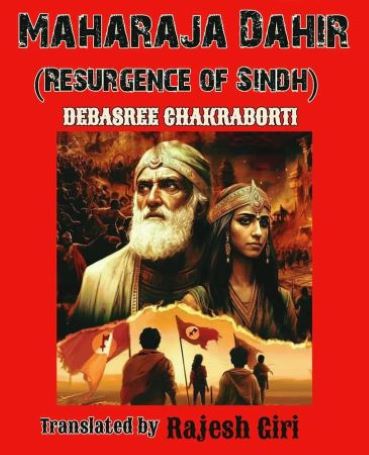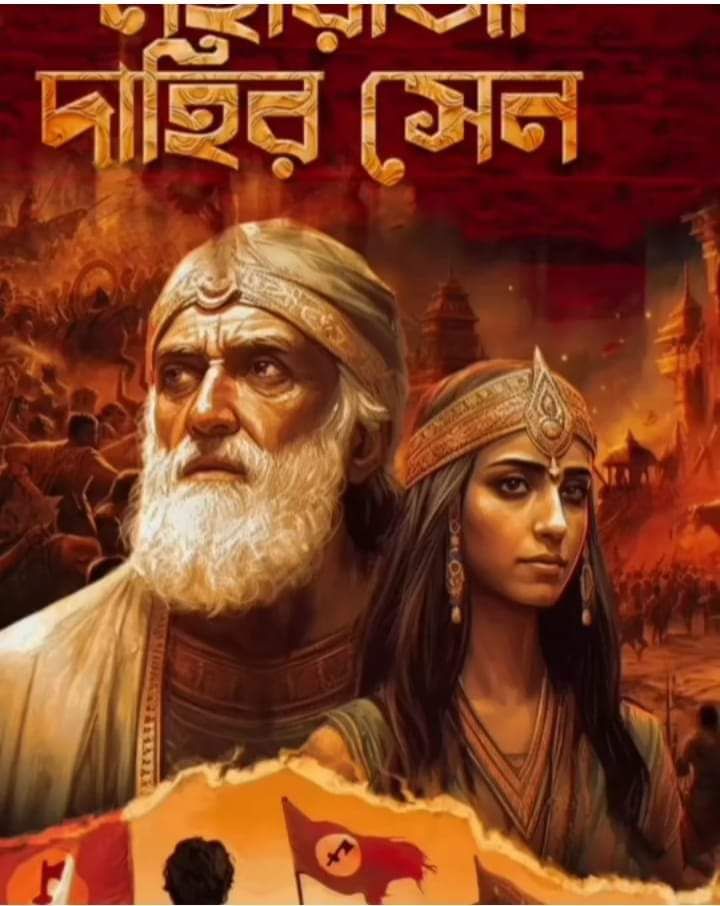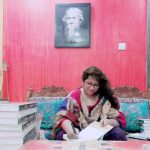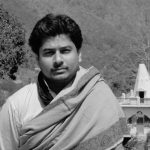
The English translation of a novel ‘Maharaja Dahir’ authored by Kolkata-based renowned novelist Debasree Chakraborti in Bengali language. The novel has been translated by Rajesh Giri
Rohri, Sindh
Year 2021
Dr. Iqbal had been in Rohri village for couple of days. Since coming here Dr. Iqbal has been suffering from diarrhea, so Sabir bhai advised him to take rest for couple of days and then he can resume work.
Today his health is in much better condition. So they will go in search of that Shiv Mandir described by Sheetal. In these two days he has completed a sufficient portion of Surya Devi’s accounts. Since coming here, he has been waking up very early in the morning. The rugged land is all around here, and sprinkles of greenery in between. In front of the house where Dr. Iqbal is staying, an ancient temple stands with its dilapidated ruins; a huge tree near the temple engulfing the entire temple. The temple is clearly visible through the window by the side of Iqbal’s bed. In the dawn, this temple looks as ancient as Sindhu Desh of Maharaja Dahir and the tree has established a new structure germinated from the seed of Mohammad bin Qasim, which is flaunting its existence by consuming the glorious past of Sindhu Desh like a parasite.
Peacocks are abundant in this region; their screams can be heard from all directions. Dr. Iqbal looks back at the temple; a new sunrise is happening from behind the temple and the glorious sunshine is emerging out from both sides of the pinnacle of the temple.
At this time he remembered Surya Devi. She wrote in one place of her account – “When the bleak news of Debal‘s fall reached Aror, everything went out of hand. I still remember that day clearly. A group of traders from Iran were going to Hindustan passing through Aror; they came to the market of Aror and said that there was nothing left of Debal city and the port. Mohammad bin Qasim and his so-called crusaders did not leave a single citizen of Debal alive; the temple of Debal is still burning. They said that every village and town of Sindh starting from Armanbela has been turned into a terrible valley of death by Mohammad bin Qasim; now he is advancing towards Aror. The news of Debal’s fall spread like wildfire throughout the city of Aror. Hearing this news, my elder brother Jai Singh accompanied by his closest friend Somaditya drove his horse for Debal. Soma was like insane; perhaps none of us had the ability to feel the fire that ignited in him that day. Since the victory of Debal, it was spread all over the place, but we could not believe it at first, because no one wanted to believe that kind of feeling could arise in Soma, who keeps himself busy all day in military training like sword fighting, ambush technique and always be with my brother Jai Singh for assistance in the governance of the fort of Sindh. Nothing was ever a secret in our Aror palace, so when Soma sent gifts to Maheshwar Vanik’s family and gifts came to his family from Maheshwar Vanik’s family, we understood the depth of this relationship. I have never seen Gauri by myself, but I have heard from those who have seen her that such a beauty is rare in the entire Sindh. I was feeling heavily for Gauri. When our father used to sit for eating before going to the court, we two sisters used to sit beside him. Even that day father was eating, I and Parimal sat on either side of him. At that time, Prime Minister Budhimaan came; he was in a frantic state. I still remember that scene; the whole body of the Prime Minister was shaking, his eyes and face were red. Finding him in such condition my father could not contemplate what to do.

My father was a son of a Brahmin, leaving the meal halfway would be disrespectful to Maa Lakshmi, so father could not stand up, but his whole body seemed to become dull anticipating a great danger.
Didn’t have to wait long. The Prime Minister said, “Maharaj!! They have finished Debal. Not a single one is alive!!! From Armanbela to Deval and on the way from Deval to Aror all cities and villages are burning, thousands of temples are being destroyed; girls are being taken from their homes and raped. They will not understand your philosophy and motto Maharaj, there is still time to take up arms.”
Prime Minister looked at me and my sister and said to His Majesty, “Your children are being turned into slaves and sent to the markets of Baghdad. All is not over yet, take up arms sir.”
Hearing all these, my father was no longer able to swallow food. He ordered the prime minister to prepare the troops. The war gong of Aror rang. Our troops began to prepare themselves to face an unknown enemy. Father was not mentally prepared for such a situation. He was preparing for celibacy in his last life, gradually freeing himself from all kinds of worldly attachments and progressing on the path of seeking God, when he was attacked by such an unknown enemy; he became perplexed. At that time, he looked like a saint, it was a very difficult task to dive into the worldly ties again after advancing so far in his path of detachment.
From that day he became completely silent. While Aror’s army is getting ready, after three days, Dada returns from Debal and starts preparations for the battle. We learned from Dada’s friend Soma that when Soma entered Debal with Dada, Debal became a valley of death. When they freed the city from the Arab invasion a few days ago, it was a vibrant and festive city, but when they entered the city after the fall, it was in ruins, with corpses strewn all over the streets. Entering the ruins of the huge Shiva temple in the middle, they witnessed the severed heads of thousands of Debal warriors.
The people of Debal fought bravely against the Arab crusaders; there is evidence scattered all around the city. Carnivorous animals and birds were devouring on the corpses everywhere in the city then. Dada and Somaditya then rushed to Maheshwar Vanik’s palace. At the entrance to the palace they found the severed heads of the two sons of Vanik and their guards. Inside this house, they find the dead bodies of Gauri and her mother in a secret cellar. Soma and Dada both cremated Gauri’s family on the seashore that day. Like Gauri and her mother, many women of Deval sacrificed themselves to Agni. From all the places along which Muhammad bin Qasim was advancing, news was coming that women were sacrificing themselves into fire to preserve their dignity. We were getting very scared and terrified. We were waiting for a completely unknown danger. The women of the palace, including our mother, decided to fight the enemy shoulder to shoulder with the men; if for any reason our father got defeated, we women would sacrifice ourselves together into fire, but still not to fall into the hands of these heathens. In between, Sheetal used to come to give flowers. I heard from Sheetal that the men of their village were also preparing to go to war with their father and the women were fervently wishing for Maharaj’s victory in this war for motherland. At that time, pujas were organized in all the temples of Aror to wish father’s victory. One day my sister Parimal and I set out very secretly with Sheetal on the way to their village Rohri. Sheetal used to say that if you do puja in the temple of Mahadev in their village, all your wishes will be fulfilled. So Parimal and I secretly offered puja to that temple for the victory of my father. The white temple on the banks of the river Sindhu resembled like a Shiv Linga from a distance, surrounded by five banyan trees, inhabited by flock of birds. When we reached there it was a little before evening; there was no one in the temple premises. Mother Sindhu was flowing behind the temple. At that time surrounded by the chirping of birds and in the twilight environment of the temple, a strange tranquility was pervaded around. I and Parimal couldn’t arrange anything for puja, Sheetal brought water from the river in an earthen pot and some wild flowers. Parimal and I poured that water onto the Shivalinga and offered Anjali to Mahadev with those wild flowers. (Continues)
Click here for Part-I , Part-II, Part-III , Part-IV , Part-V , Part-VI , Part-VII, Part-VIII , Part-IX , Part-X, Part-XI, Part-XII, Part-XIII , Part-XIV , Part-XV , Part-XVI, Part-XVII, Part-XVIII , Part-XIX, Part-XX, Part-XXI
__________________
 Debasree Chakraborti is a renowned novel writer of Bengali language. Based in Kolkata, West Bengal, India, she has done Master’s in Modern History from the Kolkata University, and authored some thirty books, mostly the novels, with historical perspective and themes. Her most recent novel is ‘Maharaja Dahir’ that covers the history of Sindh from 662, the year of first attack on Sindh by the Arab armies till date.
Debasree Chakraborti is a renowned novel writer of Bengali language. Based in Kolkata, West Bengal, India, she has done Master’s in Modern History from the Kolkata University, and authored some thirty books, mostly the novels, with historical perspective and themes. Her most recent novel is ‘Maharaja Dahir’ that covers the history of Sindh from 662, the year of first attack on Sindh by the Arab armies till date.
 Rajesh Giri, born in Kolkata, had his early schooling from Kolkata and then from Medinipur—a village in Bengal. He graduated from Calcutta University with Physics and Maths and Master’s from Burdwan University in 2016. Now he is associated with Adhdhyaan educational institution teaching Physics. History enthusiastic Rajesh Giri is particularly interested in the ancient civilization of India and other regions like Egypt, Mesopotamia, and North America. He loves traveling.
Rajesh Giri, born in Kolkata, had his early schooling from Kolkata and then from Medinipur—a village in Bengal. He graduated from Calcutta University with Physics and Maths and Master’s from Burdwan University in 2016. Now he is associated with Adhdhyaan educational institution teaching Physics. History enthusiastic Rajesh Giri is particularly interested in the ancient civilization of India and other regions like Egypt, Mesopotamia, and North America. He loves traveling.